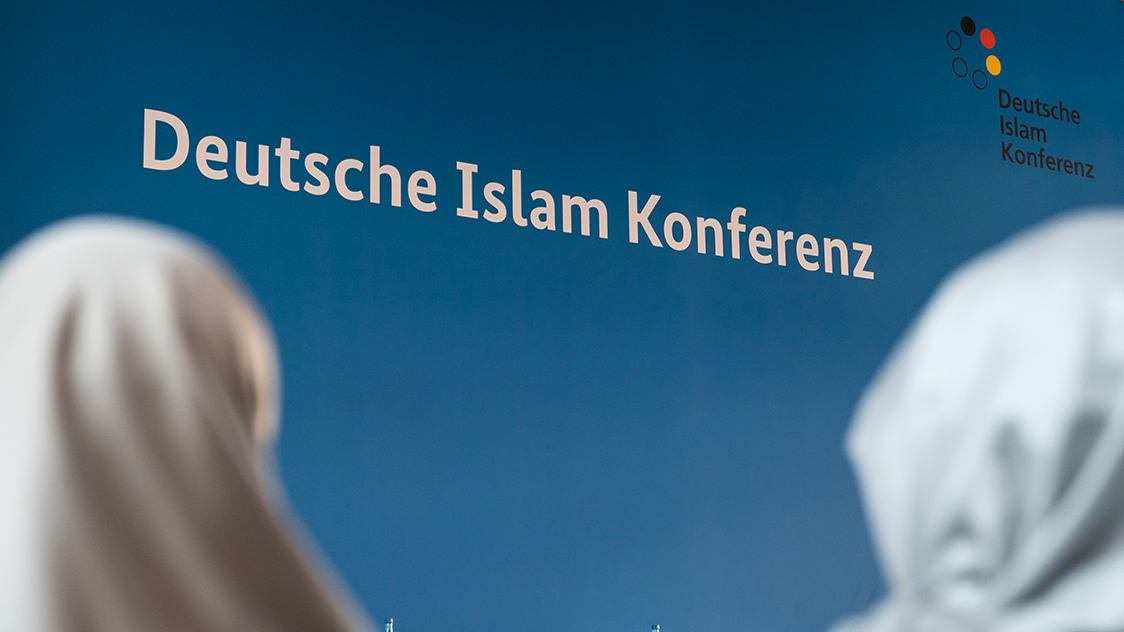DIK 2018 - 2021 (Phase IV) ,
In its fourth phase, during the legislative term from 2018 to 2021, the German Islam Conference (DIK) worked on the basis of the recommendations, statements and preliminary efforts from the preceding phases (from the 16th to 18th legislative terms) to focus on religious, integration and social policy issues in concrete, practical projects. It no longer worked in fixed forums and working groups as previously, but in flexible formats such as workshops and conferences. Depending on the subject and the aim, participants included various representatives of Muslim life and other areas of society.
At the same time, conferences and meetings were organised and conducted not only by the Federal Ministry of the Interior and Community, but also by civil-society partners and projects with the support of project funding. The Federal Ministry hosted high-level events at ministerial level, such as the DIK opening conference in 2018, a conference to mark the launch of the DIK’s support for the "mosques for integration" initiative in 2019, and a video conference to discuss training for imams in 2020.
In the wake of the COVID-19 pandemic that started in 2020, the DIK too was long unable to hold its planned events or provide a forum for interaction in its usual tried and tested formats. Nonetheless, it continued working intensively on a series of concrete projects in three focus areas:
Work in three focus areas
For example, in the focus on religious policy, progress was made on practical training for religious leaders working with Islamic congregations. The aim was and is to increase the number of imams active in German congregations who have been trained and socialised in Germany. However, Germany’s constitution limits government intervention in religious matters. Three expert meetings were held (in Hanover, Berlin and online) to discuss the current status of this issue along with the conditions and perspectives for the training of imams in Germany. Other significant progress was made in this area during the 19th legislative term:
- the Islamkolleg Deutschland e.V. (IKD) was founded to carry out a national model project for training imams in Germany, with DIK funding (project will run until 2025);
- a programme to train religious personnel was launched in January 2020, conducted by the Turkish Islamic Union (DITIB), the largest Muslim umbrella organisation in Germany;
- the University of Münster started a study programme offering a certificate for imams active in social work, which is a model project in the federal state of North Rhine-Westphalia that is co-funded by the DIK.
The integration policy focus centred on a funding initiative called "Moscheen für Integration – Öffnen, Vernetzen, Kooperieren" (Mosques for integration: open, connected, cooperative). This initiative seeks to encourage mosques to become more open and connected in their daily operations and to reduce their dependence on foreign sources. The initiative provides funding for social counselling and volunteer activities by mosque congregations and for activities which help congregations reach out to their local communities and create neighbourhood networks. The DIK also created a local expert forum to help municipalities with dialogue on possibilities and challenges in working with mosque congregations.
Key elements of the social policy focus included dialogue on preventing hostility towards Muslims, on the one hand, and antisemitism among Muslims on the other, as well as the promotion of dialogue within the Muslim community.
A workshop on antisemitism among Muslims was held in December 2019 in cooperation with the Bertelsmann Stiftung and the Anne Frank Educational Centre. The workshop facilitated the exchange of expertise and networking among practitioners of prevention and interreligious dialogue. In late April 2019, another workshop brought together practitioners, academics and representatives of Muslim civil society to discuss the phenomenon of anti-Muslim hostility and present practical approaches to prevention. In the 19th legislative term, the DIK offered forums for debate within the Muslim community concerning questions of identity and the self-organisation of Muslims in Germany. The DIK also provided support for related projects by initiatives and organisations apart from traditional mosque structures (such as Muslim Debate).
Muslim life in Germany
Further, in 2021 the DIK-commissioned study on Muslim life in Germany (Muslimisches Leben in Deutschland 2020) was completed by the Federal Office for Migration and Refugees (BAMF) and published. This study is the largest current and nationally representative study of Muslim life in Germany, including the number of Muslims, the social structure of the Muslim population, religious practices in daily life and integration issues.
Independent expert group on anti-Muslim hostility
In September 2020, the Federal Ministry of the Interior and Community established an independent expert group on anti-Muslim hostility. The expert group is not part of the DIK in the narrow sense, although it is directly related to it. The task of the expert group is to analyse current and evolving manifestations of hostility towards Muslims and examine these for overlaps with antisemitic attitudes and other forms of group-focused prejudice and exclusion. In summer 2023, the expert group will present a comprehensive report which includes specific recommendations for action.


